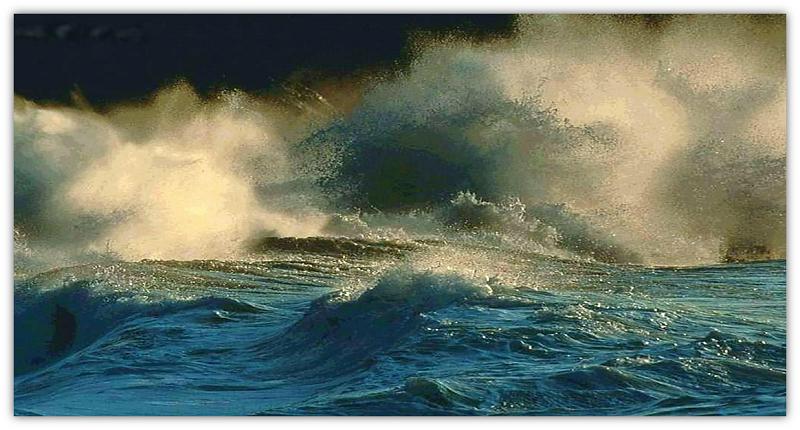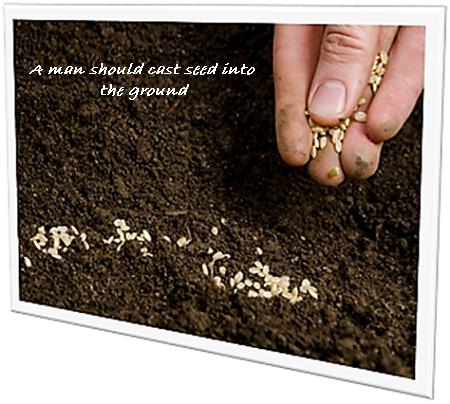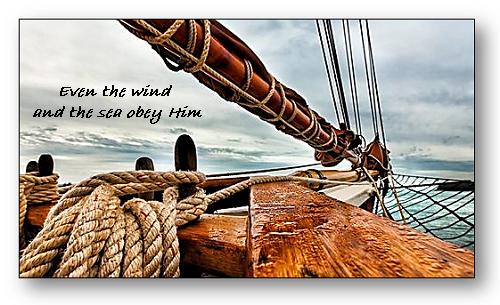Silencing the Storm at Sea
Silencing the Storm at Sea
Read Mark 4:35-41

It is relatively easy to restore calm in certain situations. A skilled teacher can calm a rowdy class; a mother can often calm a restless child. A doctor can calm an anxious patient with the good news of a favorable medical report. With skill, these situations can be managed. But there may be other situations in which restoring calm is beyond our abilities. If you stand next to an ocean during a storm, your words will do nothing to calm that storm. Waves and wind just won’t obey you. And neither do some other kinds of “winds and waves.” Think of the wave of heartache that crashes when you lose a loved one. Think of the waves of anger and bitterness that arise from the conflicts between individuals or nations. Think of the hidden storms in our hearts – of doubts, of guilt, and of anxious thoughts. We cannot calm troubled consciences or reach into despairing hearts. These things are beyond us. We need the One whose miraculous power the disciples witnessed during a storm on the Sea of Galilee.
Mysterious Classroom⤒🔗
It had been a busy day for the Lord Jesus and His disciples. He had preached to the multitudes for most of the day. It was the first time He had preached using parables – earthly stories with heavenly meanings. He told parables such as the parable of the sower, the parable of the grain of mustard seed, and the parable of leaven. It must have been a mysterious day. What these parables taught about the kingdom of God was hidden in a way, and could not be easily grasped. Afterward, Jesus had spent time with only His disciples and explained to them the meaning of what He had taught. Now the mysterious day was to become a mysterious night. Someone once said that during the day Jesus had His disciples in the classroom; during the night, He would give them a practicum.
In the evening, Jesus said, “Let us pass over unto the other side” (v. 35). They were by the Sea of Galilee, also known as the Sea of Genesaret or the Sea of Tiberias. This lake was some fifteen miles long by eight miles wide, surrounded on most sides by hills and mountains. Because many of the disciples were fishermen, they had travelled this sea frequently. We can safely assume that they entered the ship oblivious to any sign of danger. After all, this was their Lord’s order. Matthew tells us like this: “He gave commandment to depart to the other side” (Matt. 8:18).
As they set sail, we’re told, Jesus went down into the stern of the boat and fell asleep. Jesus was truly and fully man; He had taught the multitudes all day and, after a rigorous day of work, a good sleep is a gift. Just a few hours before, Christ had mentioned sleep.
So is the kingdom of God, as if a man should cast seed into the ground, and should sleep, and the seed should spring and grow up. Mark 4:26, 27
Now that Jesus had spent the day sowing the seed of God’s Word, He, like the farmer in that parable, could sleep. God’s purpose with the seed would be accomplished. Psalm 127:2 says that it is vain to stay up late and deprive your body of sleep. “For so he giveth his beloved sleep.” Here God the Father was giving His beloved Son rest and sleep after a full day of work.
Desperate Disciples←⤒🔗
While Jesus was resting in the stern of the boat, the sea under the boat grew restless. We read, “And there arose a great storm of wind” (v. 37). Although this lake is usually calm, the wind coming over the surrounding mountains can suddenly raise a vehement storm. A squall threw this sea into such tossing and turning that we read that the “waves beat (right) into the ship” (v. 37). Imagine trying to maintain your stand on deck as waves surge up over the boat until “it was now full” (v. 37).
What can you do when the ship of your life is full? One more wave, and the ship will sink down. You’ve bailed out water as fast as you can. You’ve tried to patch leaks. You’ve thrown all the cargo you can out of your life, but your boat is full and a wave away from being swallowed up.

In a certain sense this is true for all of us by nature. We may be insensitive to it – we may be blind to the waves, deaf to the wind, and unaware of our danger – but Satan is about to swallow us up. We have no safe ground under our feet, and there is just a wave between us and death. Many are asleep in a different sense – more like Jonah, oblivious to the fact that they are indeed sinking and their ship is full. If only we would see what the disciples saw and begin to cry as they did.
The disciples didn’t try to awaken Jesus immediately. They must have imagined that He would wake up at some point. There is no record of them coming to Him until the ship was full. No matter what they did, however, nothing changed for the better until these disciples went to the Lord and shook Him by the shoulder like men who were desperate. They woke their Lord and master like men who meant business. They awaken Him and say, “Master, carest thou not that we perish?”
The disciples’ question here shows their confusion. They are perplexed about how Christ could be so insensitive. But how could Christ be oblivious and uncaring? They might not have even dared to ask this question of Jesus if they had remembered a few important things:
- Had not Christ Himself brought them into this trouble? After all, He had commanded them to enter the boat. If He had been directly instrumental in ordering this circumstance, wouldn’t He be well aware of their distress?
- Christ’s words to His disciples had implied a safe arrival on the other side of the lake. He had said, “Let us pass over unto the other side” (v. 35). He knew that they would reach this other side. This is a comforting truth, also for present-day disciples of Jesus. If you are a child of God, there is another side to your sickness. There is another side to your family problem. There is another side to your convicted conscience. There is another side to your heartache. There is another side even to death, which Christ Himself brought to light in His resurrection. Jesus will ensure your safe arrival on the other side.
- Even the fact that Jesus slept should have been a lesson to the disciples. Quite possibly, Jesus slept to teach them that sleep is possible even in the fiercest storm. It’s like David said in Psalm 3: “I laid me down and slept; I awaked, for the Lord sustained me” (v. 5).
Powerful Lessons←⤒🔗
So the Lord was teaching His disciples a lesson even in His sleep. But He would also teach them a much greater lesson by waking from sleep. As He did so, He radically transformed the disciples’ situation. “And he arose, and rebuked the wind, and said unto the sea, Peace, be still” (v. 39). There are four brief lessons here.
First, there is the lesson of Christ’s power. Asleep one moment and awake the next, Christ spoke with authority to the wind and waves. Literally, Jesus said, “Be mute! Be muzzled.” With His words, He muzzled the gaping sea and its mouth was immediately shut. What power! What authority! Christ’s divinity enabled Him to speak with this kind of authority.
Second, there is the lesson of Christ’s purpose. “And there was a great calm” (v. 39). Christ’s purpose was to bring them into a great calm. He rebuked the storm not just because He is divine and powerful, but also to reveal His purpose. He had come from heaven to this tumultuous world to pay for and take away the cause of all the trouble – namely, sin. Think of the storm into which Christ would soon willingly go – the raging sea of God’s wrath on Calvary. Moreover, after His death and burial, He would arise from the “sleep” of death. Our text says, “And he arose” (v. 39), just as He arose from the grave.
Dear friend, are you in a storm now? Is Satan accusing you? Is the world buffeting you? Is your conscience a tempest? There is no calm like the calm Christ brings when He speaks peace to your storm-tossed soul. This Admiral will bring you safely into the harbor. People used to say it like this: He has not promised a calm journey, but He will give a safe arrival. He has invested everything in you and shed His blood for you. He will not leave you in the storm but will bring you safely to land. He cares for you. You will not perish.
Third, there is the lesson of the Christian’s posture. Christ was teaching the disciples what kind of posture they should have in difficult circumstances. It should be one of faith, not fear: “Why are ye so fearful? How is it that ye have no faith?” (v. 40). Remember this if you are struggling with storms in your life: walk by faith, not by sight. Christ can silence the storms as no one else can. He can bring calm to your troubled heart. He can bring courage to those who are faint. He can silence the accusing conscience. He can give you this posture by His grace and Holy Spirit.

Finally, there is the lesson of the Christian’s praise. The Lord calls us to a posture of awe and reverence for Him, as we see in the disciples when they praised Him by saying, “What manner of man is this, that even the wind and the sea obey him?” (v. 41). This was no normal man; this was the God-man. Imagine if the Lord had never brought His disciples into the storm. They wouldn’t have been able to praise Him to the same degree. In a sense, heaven will be one long unending “What manner of man – what manner of God-man is this?”
Is Christ on board the ship of your life? If not, the disciples’ question to Christ could be put to you: Don’t you care that you are perishing? Do you have an Admiral to lead you? You yourself are a mere human being! The wind and the waves will not listen to you, especially not the waves of God’s just judgment over your sin. Cry out to this infinitely capable Admiral who has proven Himself under the billows of wrath. Say with the poet:
Jesus, Savior, pilot me
over life’s tempestuous sea.
Unknown waves before me roll
hiding rock and treacherous shoal.
Chart and compass come from Thee,
Jesus, Savior, pilot me.
Only He can silence the final storm of God’s wrath that is about to break out over sinners. Yet, through the power of His voice, you too can reach the other side, where all God’s true disciples will sing forever: “What manner of man is this!”
Questions←⤒🔗
- Unlike with Jonah, this storm met the disciples in the way of obedience. How can we know whether the storms God sends us in life are to chastise us or test us?
- Read Psalm 107:23-30. Find five parallels between these verses and our passage. What does this comparison prove to us about the Person of Christ?
- Read Acts 12:5. What lessons had Peter learned that enabled him to be like his Master in the storm?
- What practical significance do you find in the little word “full” in verse 37?
- How can you help a child of God who is questioning the Lord’s care and concern, like the disciples in verse 38?
- Why are God’s children not more frequently in the posture of adoring Christ as the disciples were in verse 41?

Add new comment